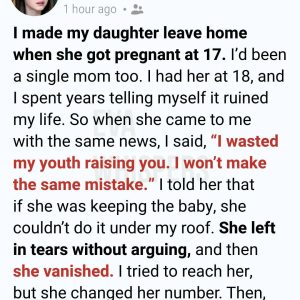Years later, when her daughter became a mother, Anna stepped up again: babysitting, quitting her job, and helping with three grandkids. She thought her sacrifices showed love.
But at a family dinner, everything unraveled.
When Anna’s sister called her a “cool mom and grandma,” her daughter snapped: “No, she’s not!” What followed shocked Anna. Her daughter accused her of using help as a guilt trip. Her son-in-law said she made them feel like a burden. In front of the whole family, they unleashed years of unspoken resentment.
Now, three weeks later, Anna hasn’t heard from them. Her heart is broken.
She asks, “Was I blind to her pain, or is she blind to mine? Should I apologize for hurting her, even if I didn’t mean to?”
Anna’s letter is a powerful reminder: even unconditional love can be misunderstood—and sometimes, the deepest wounds are the ones we never see coming.





